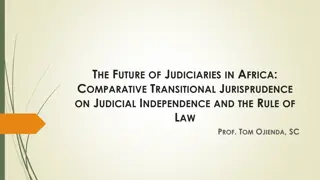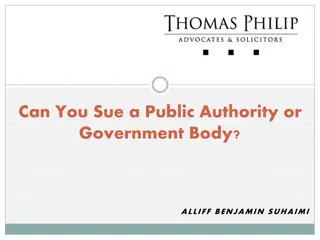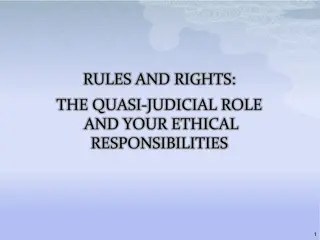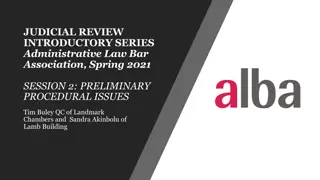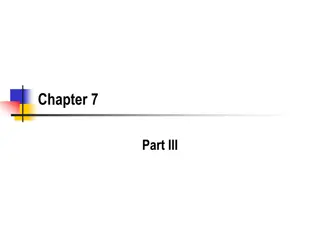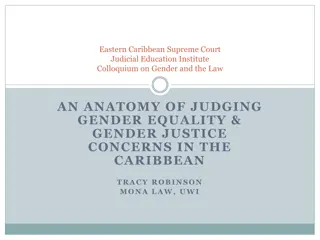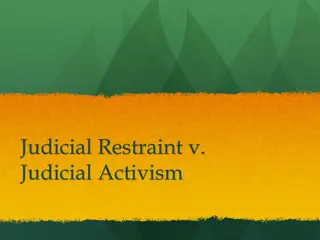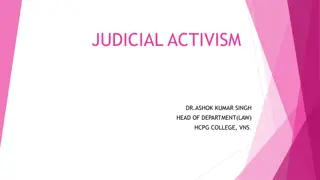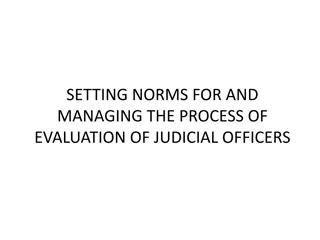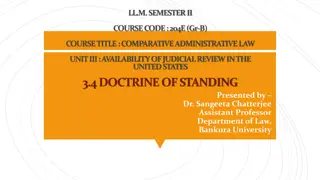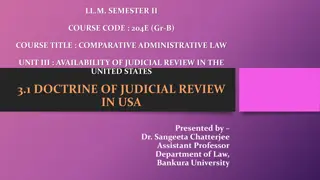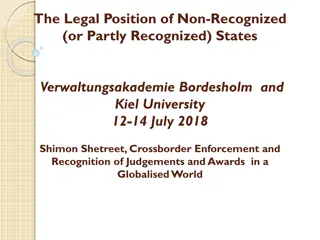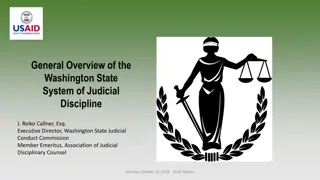Enhancing Judicial Efficiency in Mansehra: Strategies and Challenges
This presentation focuses on sensitizing judges about common mistakes causing delays, establishing effective control over cases, expediting resolution, reducing litigation costs, and restoring public confidence. It also discusses the legal systems followed, objectives of procedural law, challenges faced, and wrong practices in the judicial process.
Download Presentation

Please find below an Image/Link to download the presentation.
The content on the website is provided AS IS for your information and personal use only. It may not be sold, licensed, or shared on other websites without obtaining consent from the author.If you encounter any issues during the download, it is possible that the publisher has removed the file from their server.
You are allowed to download the files provided on this website for personal or commercial use, subject to the condition that they are used lawfully. All files are the property of their respective owners.
The content on the website is provided AS IS for your information and personal use only. It may not be sold, licensed, or shared on other websites without obtaining consent from the author.
E N D
Presentation Transcript
ZIA ZIA- -UR District & District & Sessions Judge Sessions Judge Mansehra Mansehra UR- -REHMAN REHMAN
OBJECTIVES Sensitization about common mistakes causing delay Establishing effective control of the court over the case Proper understanding and application of the law Expeditious dispute resolution(non-trial centric scheduled & time bound trial) Curtailing cost of litigation Restoring confidence of public 3
OUTCOMES Participants are expected to: Proactively assess & scrutinize the record of cases Effectively control the proceedings Avoid wasteful pre-trial activities Explore options of non-trial centric adjudication Decide admissibility of evidence before the trial Schedule time bound proceedings 4
WHICH LEGAL SYSTEM WE FOLLOW A bird s eye view of legal systems Common law- adversarial Civil Law inquisitorial Islamic Law 5
OBJECTIVES OF PROCEDURAL LAW Uniformity Discipline Parity Systemization Consistency (PLD 2014 SC 89) 6
Do we have absolute trail centric code of Civil Procedure? 7
SCHEME FOR ADJUDICATION Pleadings Order 1-9 (adversarial) Court s power to investigate and summary adjudication Order X-XV (Inquisitorial) Trials Order XVI-XX (adversarial) Executions - Order XXI Miscellaneous/supplementary 8
CHALLENGES Delay Cost of litigation Complex procedures Conventional trial Centric Approach 9
WRONG PRACTICES Adversarial Approach & misconception Non application of limini doctrine Mechanical Summoning and stereotyping Trial Centric Shifting Control Mechanical Framing of Issues Admission of Documentary Evidence without evaluating its relevance & admissibility. 10
STAGES OF A CIVIL SUIT Plaint: (Setting law in motion, Pleadings, Relief sought, Scrutiny Mechanism & matters of jurisdiction), Summons: (Registration of case, Cognizance/processes, Understanding summons, its kinds & procedure), Appearance of the Parties: (marking attendance & endorsement, supply of documents & directions), Interlocutory Proceedings: (Temporary Injunction (order 39) & disobedience petition, enforcement of injunction u/s 94 CPC, Appointment of Court Receiver (O.40), Appointment of Court Commissioner (O.26), Arrest and Attachment before Judgment (O.38), Written Statement: (O.8)(particulars, rejoinder), Examination of Parties: (O.10 CPC), 11
STAGES OF A CIVIL SUIT Framing of Issues: (O.XIV CPC) List of Document relied by the Parties Discovery, interrogatories & inspection: (O. XI) Summary adjudication: (O.XV r/w 15-A CPC) Adjudication on the basis of Affidavits: (O.XIX) Admission and Denial of Document: (O.XII) Commissions & local inspection/spot checks: (O.XXVI) 12
STAGES OF A CIVIL SUIT Production of Documents: (O.XIII) Direct & indirect evidence: (Art. 70, 71 QSO 1984), or primary & secondary evidence (Art. 73,74 QSO 1984) Burden of proof & shifting: (Art. 117 to 126) Hearing &Examination of Witness:(Art. 132 to 133 QSO 1984) and Cross Examination of the Witness (Order XVIII r/w Art.134 QSO) Argument: (Oral/written) Judgment: (appreciation principles) 13
HOW TO TAKE COGNIZANCE Scrutiny (Order (Order 7 7 Rules Rules 10 10 & & 11 11) ) Issue of Process (Nature) (Order (Order 5 5 Rule Rule 5 5 ) ) 14
SUMMONS Summons to be either to settle issues or for final disposal (Order V, Rule 5) Court shall determines before issuing the process Directions accordingly in the summons Court of small claims shall always issue summons for final disposal Summons for final disposal Appendix B, Form 1 and 2 15
LITIGANT BASED INVESTIGATION AND TRIAL NEED ASSESSMENT (CASE MANAGEMENT) The court may on its own or on application make order: (Sec 30 CPC) Discovery and answering of interrogatories Admission of documents and facts Discovery, inspection, production, impounding, and return of documents Summons to persons for evidence or production of documents Submission of affidavit for proving any fact 16
CASE MANAGEMENT Supervision or management of the time and events involved in the movement of a case through the court system from the point of initiation to disposition, regardless of the type of disposition. 17
Case Management & Scheduling Conference Establishing an early control Discouraging wasteful per-trial activities Thorough preparation of the case by the parties & their counsel Encouraging co-operation Elimination of frivolous claims Necessity or desirability of amendments , inspections & discovery. Time bound disposal of miscellaneous applications. Scrutiny of documentary evidence Summary adjudication Trial schedule 18
EVOLUTION OF CASE MANAGEMENT Roscoe Pound s theory of supporting justice 1906- one cause of dissatisfaction with the administration of justice Manifestation Resulted into diagnoses of case management Pre-Trial Conference Rule 16A of the Code of Civil Procedure of USA, 1938. is: Behavioral 19
EVOLUTION OF CASE MANAGEMENT Sir Sir Raymond Raymond Evershed s Call for more active judiciary- Judges should pursue a more active and dominant course in the interests of the litigants. Evershed s recommendations 1953:- Case Case Flow recommendations recommendations USA Flow Management Management: : Maureen USA 1970 Maureen Soloman s 1970 Soloman s Docket Docket System in in 1987 1987 System adopted adopted by by Australian Australian Federal Federal Court Court 20
EVOLUTION OF CASE MANAGEMENT UK s Wolf Reforms- Pre-Trial scheduling Rules of civil procedure 1998 New Zealand, South Africa, Singapore, Sir Lanka & Malaysia etc. Order IX-A and Order XV-A CPC (Peshawar High Court) Order IX-A, IX-B & Amendments in order XI-XII CPC (by the Lahore High Court). Conference & 21
LITIGANTS BASED INVESTIGATION Examination ------- Order X CPC Purposes is to ascertain whether allegations are admitted or denied May be oral or in writing Court may put questions Substance to be recorded 22
LITIGANTS BASED INVESTIGATION Personal attendance of the parties (where court sees reasons) Order V, Rule 3 Default, without lawful excuse, to appear in person may result into pronouncement of judgment against or into any other appropriate order (Order X, Rule 4) Summary adjudication 23
LITIGANTS BASED INVESTIGATION Discovery & Inspection ------- Order XI CPC By interrogatories: Questions, with leave of the court, to be answered by the opponents Answers on affidavits By Application for discovery of documents Any party may apply without affidavit Court may refuse or allow Objections on affidavit Production Order (Rule 14) Production on oath (Affidavit) Inspection 24
LITIGANTS BASED INVESTIGATION Discovery & Inspection ------- Order XI CPC Non-compliance; To order to answer interrogatories or for production or inspection- if plaintiff be liable to have his suit dismissed for want of prosecution if defendant to have his defense struck out. Summary Adjudication 25
LITIGANTS BASED INVESTIGATION Admission Of Of fact Document (O XII R2) Otherwise then in pleadings In Pleading On Answer to interrogatorie s (O XI, R8) Constructively (O VIII, R5) Examination by court (O X, R1) On Notice (O XII, R4) agreement of parties (O XXIII R3) On Oath (O XIV R3) Expressly 26
LITIGANTS BASED INVESTIGATION Production, impounding & return of documents ------ Order XIII CPC Documentary evidence at first hearing- shall produce Court may call upon to admit or deny (mandatory in Punjab Order XII Rule 2) Record admission or denial Effect of non production Shall not be received subsequently without showing good cause Reasons to be recorded for allowing belated production 27
LITIGANTS BASED INVESTIGATION Endorsement on rejected documents (irrelevant or inadmissible) To be returned Endorsement on admitted documents Number and title of the suit Name of the person producing the document Date of production Order / statement of its having been so admitted Signature of the judge 28
LITIGANTS BASED INVESTIGATION Issues ----- Order XIV Issues of law to be decided first Material from which issues may be framed (R 3) Allegations in pleading Allegations on oath Answers to interrogatories Contents of documents 29
LITIGANTS BASED INVESTIGATION Agreement of parties in form of issues (R-VI) Hearing & decision on agreed upon issues (R-VII) Summary Adjudication Referral to ADR 30
SUMMARY JUDGMENT Significance Scope Procedure Impact 31
PRACTICAL EXERCISES Partition Case, WAPDA Case Specific Performance Declaratory Suit NADRA Case, Land Acquisition Reference, Removal of Encroachment, 32
Trial Management Trial Management Civil Preliminaries Consultation with parties and councils within 07 days to establish a schedule for; Presentation & exchange of list of witnesses on proforma F1 &F2 Certificate of readiness on proforma. Deposit of Diet money (TA, Expenses & remuneration Order 16 Rule 1 & 4) Lawyers Database Schedule an Event, not dates De Die in Diem (Order 9-A Rule 4 (c) & Order 17 Rule 1- provisio Within 06 months (Act) & 01 years (Rules) (Order 9-A Rule 4) 33
EVIDENCE RECORDING Order of examination Official witnesses, of facts and record Diet money Oral and documentary evidence Exhibits, marks and annexures Significance of supervision of examination of witnesses Handling objections Penal provisions and judicial restraint 34
HEARING OF ARGUMENTS Significance of notes Dealing with precedents 35
JUDGMENT WRITING Essentials Appreciation of evidence Decree sheet, common mistakes 36
TIPS Take effective Control of the proceedings, Plan time frame for a case, Devise adjournment plan, Engage lawyers in scheduling your plans, Supervise examination and decide objections, Award Costs, Ensure file completion and compilation. 37
THANKS 38






